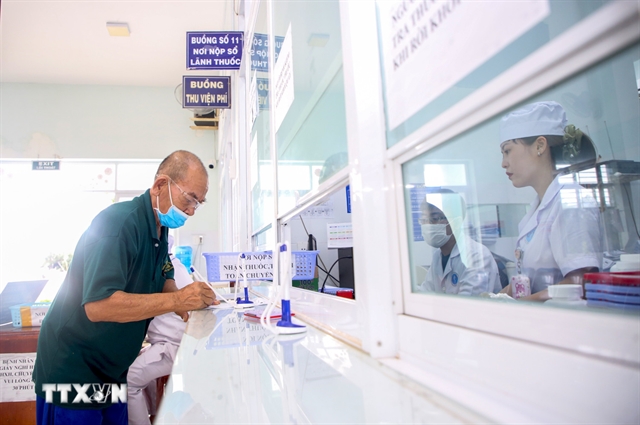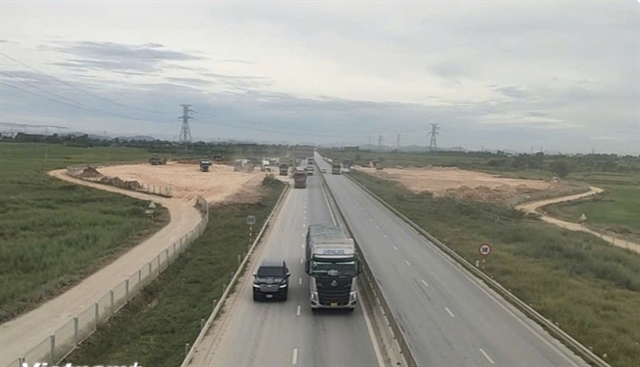 Society
Society


|
| The construction site of a rest stop on North-South Expressway. VNA/VNS Photo |
HÀ NỘI — Rest stops along the eastern section of the North–South Expressway must be completed within the next three months as directed by the Government and the Ministry of Construction. Many sites remain behind schedule, raising concerns over the planned start of toll collection for expressway projects in early 2026.
The Department for Roads of Việt Nam (DRVN) reported that several rest stops on the Vân Phong–Nha Trang, Vạn Ninh–Cam Lộ, Mai Sơn–National Highway 45, Nghi Sơn–Diễn Châu, Diễn Châu–Bãi Vọt, and Nha Trang–Cam Lâm sections are still lagging behind committed timelines.
Seven of the nine rest stops have completed 100 per cent of land clearance, while two — in Quảng Ngãi and Khánh Hòa — continue to face site clearance issues expected to be resolved in October 2025. All nine projects have obtained environmental permits and eight have received project approval; the Quảng Ngãi–Hoài Nhơn stop remains pending approval.
Preparatory works at rest stops on the Bùng–Vạn Ninh, Vạn Ninh–Cam Lộ, Quảng Ngãi–Hoài Nhơn, Vân Phong–Nha Trang, and Nha Trang–Cam Lâm sections remain slow, with incomplete design approvals and unfinished ground-levelling. Some stops have completed only 40–70 per cent of levelling, with little progress on technical infrastructure or service facilities.
Petrolimex, the consortium that won the bidding for the nine rest stop projects, attributed the delays to unfavourable weather, particularly prolonged heavy rains, and challenges in securing construction sites. Contractors were forced to rearrange schedules and adopt staggered partial construction, reducing efficiency.
“Fluctuations in material and fuel prices have also significantly impacted costs and contractors’ ability to mobilise resources. Prices of petrol, steel, bitumen, and cement at times surged, pushing total costs beyond initial estimates and increasing financial pressure on investors,” a Petrolimex representative said.
Delays in obtaining transport permits extended equipment mobilisation times, and synchronisation across different construction items depended heavily on coordination among contractors, consultants, and investors.
To accelerate progress, Petrolimex pledged to maximise human and financial resources, coordinate closely with DRVN and local authorities, expedite investment procedures, complete design documentation and land clearance, and organise construction efficiently. The group committed to overtime and restructuring construction lines to ensure uninterrupted work, timely completion, and high-quality, synchronised facilities.
Sanctions
Viewing the rest stops as essential public service facilities, DRVN director Bùi Quang Thái said delays harm investor credibility and affect the development of comprehensive infrastructure and services along the expressway.
“Investors must urgently rectify delays, finalise project approvals, complete technical designs, and mobilise sufficient manpower and machinery for simultaneous construction. Further delays are unacceptable. Each passing month adds to the shared responsibility of all stakeholders. Investors must demonstrate capability and commitment,” Thái said.
The administration will review progress for each rest stop, and if improvements are not observed, may consider contract termination and report to the Ministry of Construction and the National Steering Committee for Key Projects to enforce investor accountability.
Project management units have been instructed to coordinate with local authorities to resolve land and financial issues, including providing accounts for investors to pay remaining land compensation costs. Local authorities are also tasked with assisting construction, securing material supplies, and identifying waste disposal sites.
The appraisal agency will strengthen on-site inspection and supervision, promptly address contractor challenges, and require investors to commit to monthly progress milestones, with accountability assigned to each station’s lead manager. — VNS




